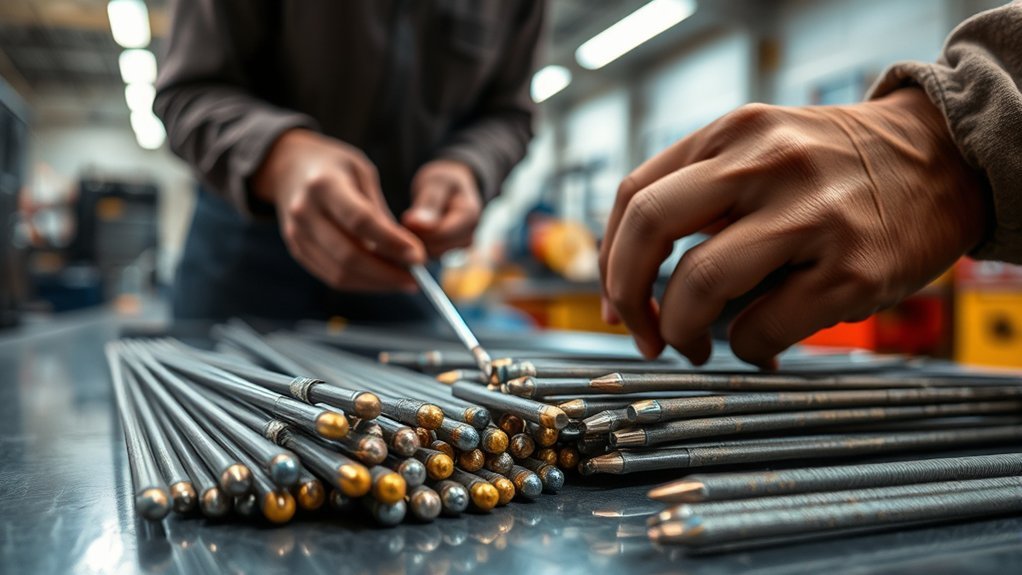Welding electrode costs vary considerably based on type and brand. For instance, Lincoln 6010 electrodes typically cost about $37.80 for a 50-pound can, while E7018 options range from $44.50 to $46.30 for the same weight. Specialty electrodes, like MR-Nickel 99, can go higher at around $7.42 per pound. Factors such as demand fluctuations and material availability also influence pricing. If you’re curious about maximizing your savings and understanding more about electrode choices, there’s plenty more to explore.
Overview of Welding Electrode Pricing
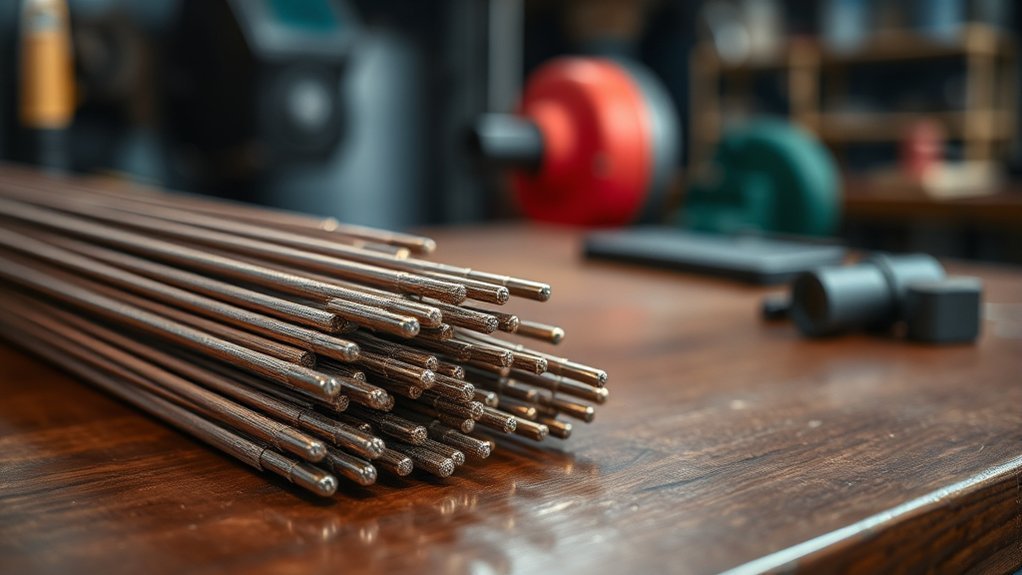
When you’re considering welding electrodes, understanding the pricing structure is essential for budgeting your projects. The cost varies considerably based on electrode quality and type.
For instance, Lincoln 6010 electrodes are priced at approximately $37.80 for a 50-pound can, while the more robust 7018 electrodes range from $44.50 to $46.30 for the same weight.
Hobart’s E7018 stick electrodes come in smaller, competitive packages, with 5-pound boxes costing around $22.70 to $24.65.
Specialty options, like MR-Nickel 99, showcase a price of $7.42 per pound, highlighting the diverse applications and efficiencies available.
Additionally, carbon arc gouging electrodes start at $16.00, reflecting a budget-friendly option for specific tasks, ultimately affecting your project’s overall welding efficiency.
Factors Influencing Welding Electrode Costs
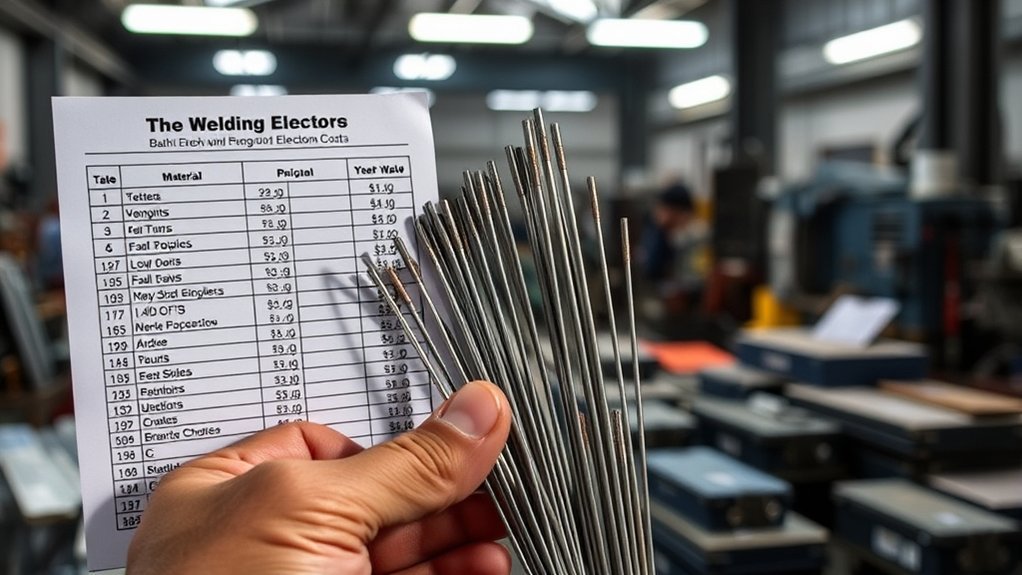
When considering the cost of welding electrodes, you’ll notice significant variability based on electrode type and market demand.
Specialty electrodes, designed for specific applications like stainless steel or aluminum, often come at a premium price due to their unique compositions.
Additionally, fluctuations in market demand can lead to price changes, especially during high-demand periods, impacting your overall purchasing strategy.
Electrode Type Variability
Although various factors contribute to the cost of welding electrodes, the type of electrode used is one of the most significant influences. Different electrode materials cater to specific welding applications, affecting their pricing.
For instance, a common E6010 electrode costs around $30.10 for a 5 lb box, while specialized options like MR-Nickel 99 are priced lower at $7.42 for a 1 lb mini pack.
Low-hydrogen electrodes, such as Lincoln Excalibur 7018, can range from $187.30 to $219.00 for a 30 lb carton due to their advanced formulation.
Additionally, electrode diameter impacts costs; smaller diameters like 3/32 inch are generally cheaper than larger ones, which can reach up to $44.50 for a 50 lb can.
Market Demand Fluctuations
The cost of welding electrodes is considerably influenced by market demand, which can fluctuate based on industry needs. You’ll notice that increased activity in sectors like construction and manufacturing often raises demand for commonly used electrodes, such as 7018, driving up prices.
Seasonal trends also play a role; warmer months typically see heightened construction efforts, resulting in higher demand and costs. Additionally, the availability of raw materials, including steel and alloys, directly impacts pricing. Disruptions in supply chains can lead to cost increases for manufacturers.
Finally, keep an eye on market trends and demand forecasting, as technological advancements and new alloy introductions may initially command higher prices before gaining widespread acceptance.
Common Types and Their Price Ranges
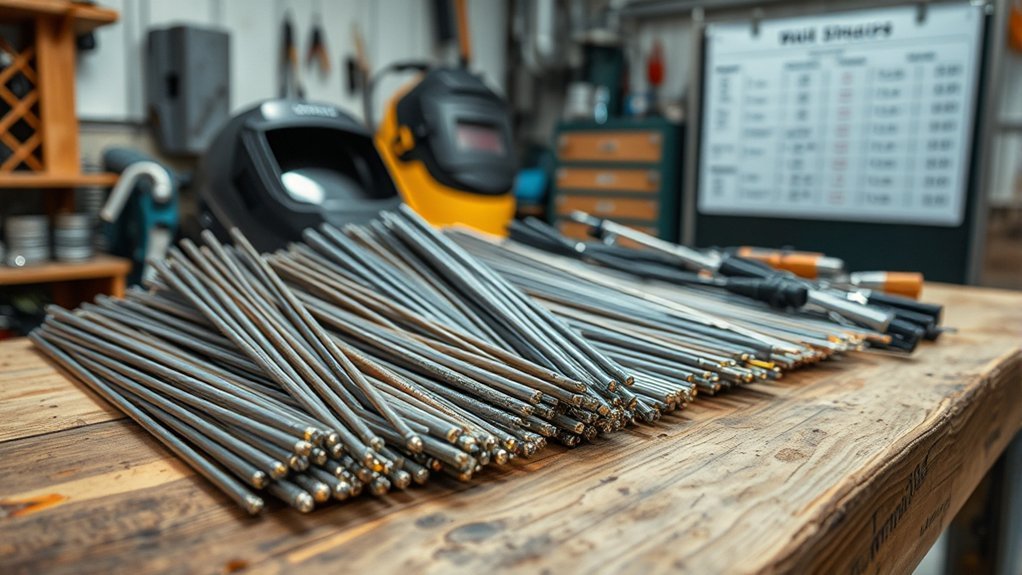
Understanding the common types of welding electrodes and their price ranges can help you make informed purchasing decisions for your projects.
Familiarizing yourself with welding electrode types and prices enhances your ability to make smart purchasing choices for your projects.
Key welding electrode types include E6010, E7018, and E7014, with prices typically ranging from $6.60 to $46.30 for 5 lb. boxes, influenced by size and specific type.
For example, you’ll find the Lincoln Excalibur 7018-1/8 priced at $44.50 for a 50 lb. can, while the Hobart E7018 3/32 costs $24.65 for a 5 lb. box.
Additionally, aluminum welding electrodes like the Hobart 4043 are around $13.95 for ten, reflecting market demand and specialized usage.
These pricing variations highlight the importance of selecting the right electrode for your specific welding needs.
Specialty Welding Electrodes and Their Costs
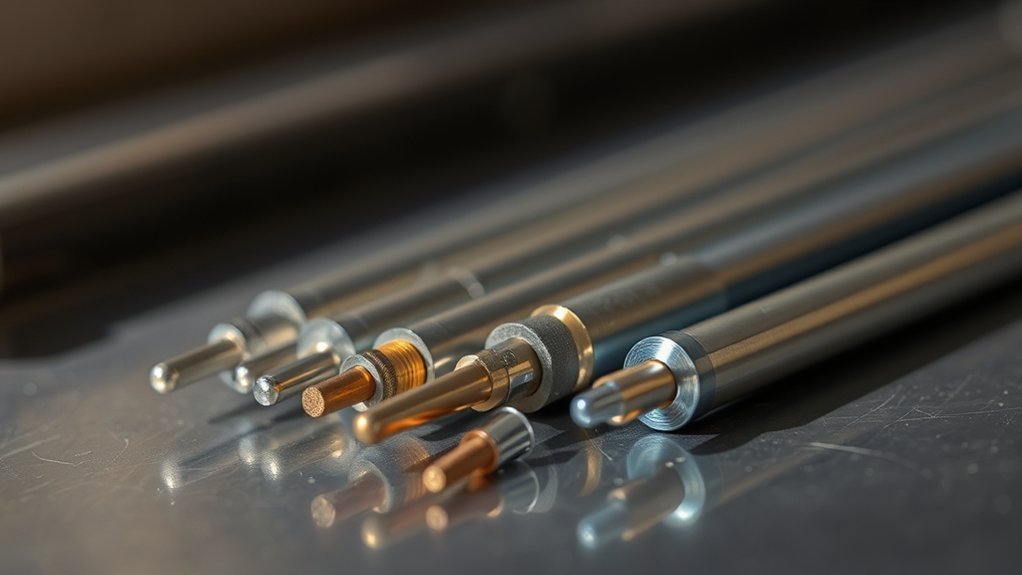
What makes specialty welding electrodes essential for specific applications? These electrodes are tailored for unique welding tasks, ensuring ideal performance and efficiency. They’re priced accordingly, reflecting their specialized properties.
| Electrode Type | Price (Lowest) |
|---|---|
| Carbon Arc Gouging (50 pcs) | $16.00 |
| Harris Super Missileweld | $32.20 |
| Harris NIC-L-WELD 59 for Cast Iron | $42.85 |
| Weld-Forge (3/16 to 3/8 diameter) | $30.00 |
When evaluating electrode performance, consider factors like material compatibility and application requirements. Specialty electrode applications often demand higher precision, justifying their costs, as they contribute notably to the success of complex welding projects.
Bulk Purchase Discounts and Savings Opportunities
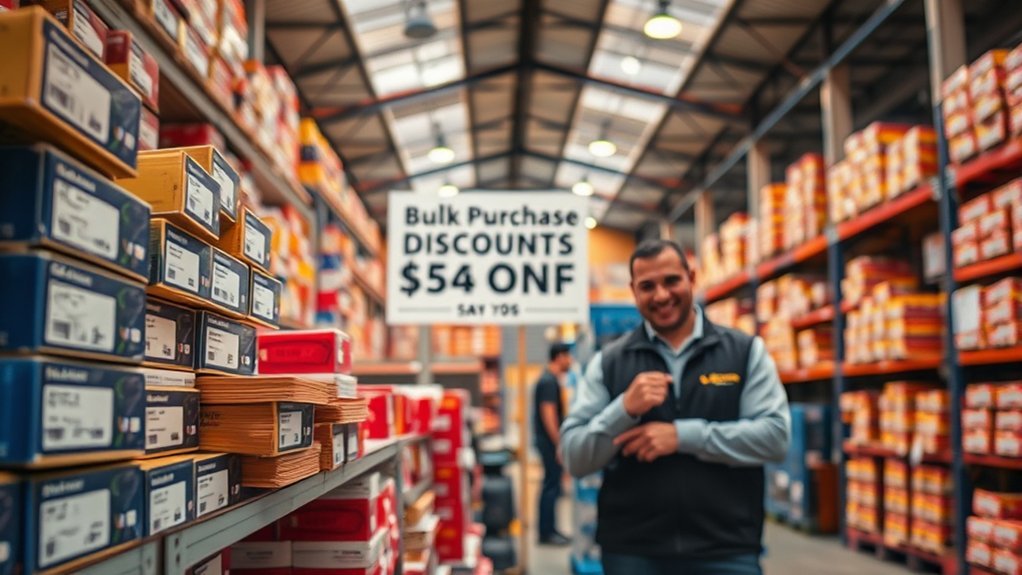
When managing a welding project, finding cost-effective solutions without sacrificing quality is key.
Bulk purchase discounts offer significant savings opportunities that can enhance your purchasing strategies.
Consider the following benefits:
- Lincoln’s 30 lb. Master Carton of Fleetweld 5P+ E6010 is available for $217.75, saving you $12.05.
- Hobart’s 30 lb. Master Carton of E7018 electrodes costs $187.30, providing $10.70 in savings.
- Discounts often reach up to 30% for bulk purchases compared to individual pricing.
- Mini packs, like the MR-Nickel 99 1/8 Electrode at $7.42 for 1 lb., are ideal for smaller projects while still offering bulk savings.
Comparing Prices Across Different Brands
While evaluating your welding needs, comparing prices across different brands becomes essential for making informed purchasing decisions. Different manufacturers employ various pricing strategies, impacting your overall costs. Here’s a quick comparison for reference:
| Brand | Electrode Type | Price (for specified weight) |
|---|---|---|
| Lincoln | 6010-1/8 5P+ | $37.80 (50 lbs) |
| Hobart | E7018 1/8 | $22.70 (5 lbs) |
| MR-Nickel | 99 1/8 | $7.42 (1 lb) |
As you can see, brand comparisons reveal significant price variations based on size and type. Specialty electrodes often carry premium prices, such as the Harris NIC-L-WELD 59 at $42.85. Understanding these differences helps you choose the best option for your projects.
Regional Variations in Welding Electrode Pricing
As you explore the costs of welding electrodes, you’ll notice that regional variations play a vital role in pricing.
Factors influencing these differences include:
- Local Supply and Demand: Limited availability can drive prices up, while surplus may lower them.
- Brand Variations: Different electrodes like the Lincoln 6010-1/8 and Hobart E7018 can vary widely in cost based on brand reputation and performance.
- Regional Pricing Trends: Prices can range from $6.60 to over $200 based on market conditions.
- Supply Chain Efficiency: Regions with better logistics may offer lower prices due to reduced shipping costs.
Understanding these factors is essential for making informed purchasing decisions, particularly as regional pricing affects overall costs considerably.
Tips for Selecting Cost-Effective Welding Electrodes
Selecting cost-effective welding electrodes requires a strategic approach that considers various factors to optimize your investment. Focus on bulk purchasing options, like 50-pound cans, to save money. Evaluate electrode performance and specific application needs to guarantee welding safety and quality.
Here’s a quick comparison table to guide your selection:
| Electrode Type | Price |
|---|---|
| E6010 (50 lbs) | $37.80 |
| E7018 (50 lbs) | $44.50 |
| Hobart E7018 (5 lbs) | $22.70 |
| Hobart 4043 (10 pcs) | $13.95 |
Future Trends in Welding Electrode Pricing
The pricing landscape for welding electrodes is evolving, shaped by various factors that are likely to impact your future purchasing decisions.
As you navigate this changing market, consider these trends:
- Sustainability practices are driving the demand for low-hydrogen electrodes, pushing prices upward.
- Innovative technologies in alloy compositions may initially increase costs but promise long-term savings through enhanced performance.
- Fluctuations in raw material costs, especially for specialty electrodes, will continue to affect pricing.
- Economic factors, including supply chain disruptions and global demand, will remain influential.
Frequently Asked Questions
How Do I Choose the Right Electrode for My Project?
To choose the right electrode, assess your project specifications like material type and thickness. Then, consider electrode types such as E7018 or E6013, ensuring they match your welding technique and desired strength for ideal results.
Can I Use Different Brands of Electrodes Together?
You can mix brands, but tread carefully. Just like a symphony, electrode compatibility matters; different brands may not harmonize well, affecting brand performance. Always check specifications to guarantee your welding project hits the right notes.
What Safety Gear Is Needed When Using Welding Electrodes?
When using welding electrodes, you need proper welding safety gear. This includes a welding helmet, gloves, flame-resistant clothing, and safety glasses. Don’t forget to wear steel-toed boots for added protection against sparks and heavy equipment.
How Should Welding Electrodes Be Stored?
You should store welding electrodes in a dry, controlled environment. Humidity control is essential to prevent moisture absorption, which can compromise performance. Use sealed containers or cabinets designed for electrode storage to maintain ideal conditions.
Are There Environmentally Friendly Welding Electrode Options Available?
You’ll find eco-friendly options that utilize sustainable materials, drastically reducing environmental impact. These innovative electrodes not only meet performance standards but also contribute to a greener world. Embrace your responsibility as a welder!
Conclusion
In summary, understanding welding electrode costs is essential for budgeting your projects effectively. Did you know that the average price of a standard E6011 electrode ranges from $0.60 to $1.20 per pound? This highlights the importance of selecting the right type for your needs. By considering factors like bulk purchases and brand comparisons, you can greatly reduce expenses. Staying informed about market trends will also help you make smarter purchasing decisions in the long run.

